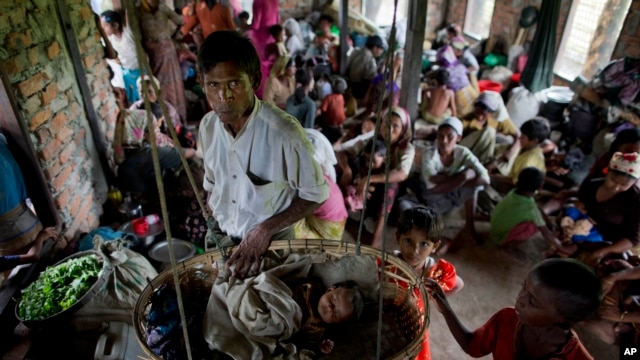 FILE
- Internally displaced Rohingya people take shelter in a building ahead
of the arrival of Cyclone Mahasen, in Sittwe, northwestern Rakhine
State, Myanmar, May 15, 2013.
FILE
- Internally displaced Rohingya people take shelter in a building ahead
of the arrival of Cyclone Mahasen, in Sittwe, northwestern Rakhine
State, Myanmar, May 15, 2013.
September 12, 2014 10:49 AM
According to experts, there remains an urgent need for health services and humanitarian assistance despite recent progress.
U.N. Development Program Asia Pacific director Haoliang Xu, during a two-day official visit to western Rakhine state, said there is a need for more humanitarian and medical assistance in displacement camps where up to 140,000 people, mostly Muslim Rohingya, are still housed.
"The most pressing need is health services it seems to me. The basic services are provided although the camp is quite crowded in the low lying area - and the most urgent need is medical services," Xu said. "The long term solution is to get these people out of the camps - that's why we want to support a multipronged approach to this issue."
Violence between Buddhist and Muslim communities erupted in 2012, and led to widespread bloodshed that killed at least 192 people, and displaced some 140,000 others. Many of the Rohingya now live in guarded camps, where their movements are restricted.
Xu says there appears to be some progress despite ongoing communal tensions. This week the government of Myanmar - also known as Burma - lifted a curfew in the region imposed in June 2012 at the height of the bloodshed.
The central government also signed an agreement with medical charity Doctors without Borders (MSF), which was part of a group of charities forced to leave Rakhine State after Buddhists targeted their local offices accusing them of favoring Muslims. The agreement allows MSF to work in five states, including Rakhine.
The Rohingya Muslims were made stateless by a 1982 Act by the then military government. Many do carry an identity card that allows them to vote. The Myanmar government has pressured international organizations and governments to halt any reference to the Muslim minority as Rohingya, and instead refer to the Muslim community in Rakhine state as "Bengalis."
Human Rights Watch deputy Asia director, Phil Robertson, says much still needs to be done to improve the human rights situation for Rohingya who are denied rights of freedom of movement and are in turn unable to support themselves.
"We don't see a significant improvement in human rights and we certainly don't see any changes about the issues of statelessness or denial of citizenship that are the core problems that afflict the Rohingya that basically are the pillar upon which all the other problems are based," he said.
Myanmar’s government has put in place a process for national verification of citizenship, but Chris Lewa, an activist and director of the Arakan Project, says there are daily arrests and harassment as Rohingya refuse to participate in the registration process.
"There is no progress at all," she said. "Actually since that this is likely to become even worse because the authorities use tactics now to try to force people to participate. Now they prevent anyone to cross the check point if they don't have the form to confirm they have participated. So people who refuse are simply not allowed through to markets, to fishing."
Analysts say the issue of ethnic divisions will become more prominent in the lead up to the 2015 national elections, further deeply dividing the communities ahead of the polls amid fears of further violence.
Source: here
No comments:
Post a Comment